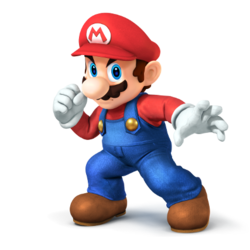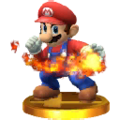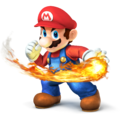Mario (SSB4)
| Mario in Super Smash Bros. 4 | |
|---|---|
 
| |
| Universe | Mario |
| Other playable appearances | in SSB in Melee in Brawl |
| Availability | Starter |
| Final Smash | Mario Finale |
Mario (マリオ, Mario) was confirmed to be a playable character in Super Smash Bros. 4 on June 11th, 2013 during the E3 2013 Nintendo Direct.[1] He was also one of the main subjects of the Developer's Direct for Smash Bros. later during E3 2013.[2] He will be among the first wave of amiibo figurines for Super Smash Bros. for Wii U. Mario is voiced by Charles Martinet, who also is reprising his long-time role as Luigi, Wario, and Waluigi, albeit mostly with the same voice clips from Super Smash Bros. Brawl. [3]
Changes from Brawl
Mario has been buffed from Brawl to Smash 4. He appears to be quicker and stronger than in past games. His reach seems somewhat greater as well.
 Mario has slightly increased air speed.
Mario has slightly increased air speed. Many of his attacks have been sped up.
Many of his attacks have been sped up. Many of his attacks deal less damage.
Many of his attacks deal less damage. Forward tilt deals less damage, and has a slightly shorter range.
Forward tilt deals less damage, and has a slightly shorter range. Forward smash has a larger blast, making it have a larger hitbox.
Forward smash has a larger blast, making it have a larger hitbox. Up smash and back aerial both deal slightly more damage.
Up smash and back aerial both deal slightly more damage. Down smash has much stronger knockback.
Down smash has much stronger knockback. However, it deals noticeably less damage.
However, it deals noticeably less damage. Forward aerial's speed, knockback, and damage have been increased.
Forward aerial's speed, knockback, and damage have been increased. His back aerial appears to have strengthened, and its ending lag has been noticeably reduced.
His back aerial appears to have strengthened, and its ending lag has been noticeably reduced. Mario now grabs with one hand as opposed to two.
Mario now grabs with one hand as opposed to two. Back throw is slightly more powerful on both the throw and hitting bystanders. It has also been sped up a bit.
Back throw is slightly more powerful on both the throw and hitting bystanders. It has also been sped up a bit. Down throw has drastically less base knockback, allowing it to combo into other moves more reliably at lower percentages.
Down throw has drastically less base knockback, allowing it to combo into other moves more reliably at lower percentages. Fireballs have higher falling speed.
Fireballs have higher falling speed. When a fireball hits a foe, the sound effect that plays when an enemy is defeated in Super Mario Bros. plays.
When a fireball hits a foe, the sound effect that plays when an enemy is defeated in Super Mario Bros. plays. Cape deals less damage when on the ground.
Cape deals less damage when on the ground. Hitting with the cape now makes a sound effect akin to Mario spinning his cape in Super Mario World (but faster and higher-pitched).
Hitting with the cape now makes a sound effect akin to Mario spinning his cape in Super Mario World (but faster and higher-pitched). F.L.U.D.D. has increased range.
F.L.U.D.D. has increased range. Super Jump Punch deals slightly less damage.
Super Jump Punch deals slightly less damage. Super Jump Punch makes a slightly higher-pitched ding on the last hit.
Super Jump Punch makes a slightly higher-pitched ding on the last hit. The coins from the Super Jump Punch are now 3D and designed closer to the Star Coins from the New Super Mario Bros. series.
The coins from the Super Jump Punch are now 3D and designed closer to the Star Coins from the New Super Mario Bros. series. Mario Finale does more damage than in Brawl.
Mario Finale does more damage than in Brawl. Mario Finale has less vertical range.
Mario Finale has less vertical range.
Instead of the more realistic look he had in Brawl, Mario has a more cartoonish and sleeker look that's more like his appearances in the Mario games. His clothes are more brightly colored, and the seams in his overalls are much less accentuated. His proportions are more inline with recent 3D Mario games such as Super Mario Galaxy or Super Mario 3D Land. For example, his head is smaller than it was in Brawl to fit with these proportions.
Unlike in previous installments, Mario will now have his chest facing the foreground regardless of whether he's facing left or right.
Moveset
| Name | Damage | Description | ||
|---|---|---|---|---|
| Neutral attack | Punch-Kick Combo | 2% | Mario jabs with one fist, his other fist, and then finishes with a forward kick. Originates from Super Mario 64. | |
| 2% | ||||
| 4% | ||||
| Forward tilt | Plumber Kick | 7% | Mario performs a spinning kick. | |
| Up tilt | Uppercut | 7% | Mario performs a spinning uppercut from Super Mario RPG: Legend of the Seven Stars. | |
| Down tilt | Crouch Kick | 5% | Mario sweeps with his leg low to the ground. | |
| Dash attack | Slide Kick | 8% | Mario slides forward and kicks with both feet as done in Super Mario 64. | |
| Forward smash | Fire Smash | 16% | Mario thrusts his arm forward and produces a small blast of fire. It is larger than in previous installments. | |
| Up smash | Lead Headbutt | 15% | Mario performs a standard headbutt skyward. | |
| Down smash | Breakdance Kick | 11% | Mario performs a breakdance sweep that originated from Super Mario 64. | |
| Neutral aerial | Plumber's Boot | 9% | Mario does a sex kick similar to a move from Super Mario 64. | |
| Forward aerial | Plunger | 10% | Mario punches forward and initiates a meteor smash upon impact. | |
| Back aerial | Drop Kick | 11% | Mario spins and kicks backward. It appears to be based on his original forward aerial from Super Smash Bros. for the Nintendo 64. | |
| Up aerial | Bicycle Kick | 7% | Mario performs a somersault and kicks backward. | |
| Down aerial | Mario Tornado | 10% total | Mario spins with both both fists outward. It was one of Mario's special moves up until Super Smash Bros. Brawl. | |
| Grab | — | Mario's grab range is relatively short. | ||
| Pummel | Clutch Headbutt | 2% | Headbutts opponent. | |
| Forward throw | Heave-Ho | 7% | Mario spins his opponent around once and tosses the opponent forward. | |
| Back throw | Koopa Toss | 11% | A powerful throw that has Mario spinning the opponent several times and throwing the opponent in the opposite direction grabbed. Originates from Super Mario 64. | |
| Up throw | Mario Launch | 7% | Mario throws his opponent high into the air with both hands. | |
| Down throw | Down the Drain | 5% | Mario slams his opponent into the ground. | |
| Forward roll Back roll Spot dodge Air dodge |
— | — | ||
| Techs | — | — | ||
| Floor attack (front) Floor getups (front) |
Sweep Kick | ?% | Gets up then kicks behind him, then in front of him. | |
| Floor attack (back) Floor getups (back) |
Double Punch | ?% | Gets up then punches behind him, then in front of him. | |
| Floor attack (trip) Floor getups (trip) |
Double Kick | ?% | Kicks behind him, then in front of him while getting up. | |
| Edge attack Edge getups |
||||
| Neutral special | Default | Fireball | 5% | Mario fires a weak, bouncy ball of flames is shot from his hand as a projectile. |
| Custom 1 | Fast Fireball | 2% | Mario quickly fires a ball of flame as if a shot from the Ray Gun. It does not bounce on the ground. | |
| Custom 2 | Fire Orb | 8% total | A slow but large orb of fire is launched from Mario's hand. It will damage any opponent it hits in its predetermined path until it fades away, because unlike the other two variants of Fireball it does not disappear upon impact. | |
| Side special | Default | Cape | 4% | Mario swings a defensive cape that reflects projectiles and enemies. It can also be used as a brief but continuously available recovery. |
| Custom 1 | Shocking Cape | 11% | An offensive variant of Cape that shoots electricity. It cannot be used to reflect projectiles. | |
| Custom 2 | Gust Cape | 4% | Mario shoots a small gusts of wind from his cape, pushing his opponent back in addition to turning them around. | |
| Up special | Default | Super Jump Punch | 12% total | Mario performs an upward punch that releases aesthetic coins from those it hits. |
| Custom 1 | Super Jump | 0% | A recovery giving more distance than the standard Super Jump Punch, at the cost of not having a hitbox. | |
| Custom 2 | Explosive Punch | 8% (hit 1), 13% (hit 2) | A much stronger recovery move that causes explosive fire damage instead of releasing star coins. | |
| Down special | Default | F.L.U.D.D. | 0% | Mario pulls out F.L.U.D.D. from Super Mario Sunshine, which will blast jets of water to push back opponents, but not damage them. Mario can now change the angle of the stream. |
| Custom 1 | Scalding F.L.U.D.D. | 9% total | The jets of water fired now emit steam as well. It deals rapid fire damage that keeps the enemy in place. | |
| Custom 2 | High-Pressure F.L.U.D.D. | 0% | The water will push back foes further than the normal F.L.U.D.D., but has a slower charging time. | |
| Final Smash | Mario Finale | 31% total | Mario's final smash from Super Smash Bros. Brawl. He shoots a massive tornado of flames horizontally across the stage. | |
Taunts
- Transforms into Super Mario as if he obtained a Super Mushroom. He immediately shrinks back to normal size afterwards. Based upon Super Mario Bros.
- Takes off his hat, twirls around, and says "woo hoo!" He then puts his hat back on. It may be based upon New Super Mario Bros., where he does the same pose after reaching the top of a level's flag.
- Spins in the air and falls to the ground with his legs in the air. It is based on the dying animation from Donkey Kong.
On-Screen Appearance
A green Warp Pipe appears. Mario leaps out in an iconic pose and shouts "Let's-a go!".[4]
Victory Fanfare
A flourished remix directly from Brawl based on the sound clip that would play when Mario reaches the end of a level in Super Mario Bros. It is shared with Luigi, Dr. Mario, and Peach.
Alternate costumes

| |||||||

|

|

|

|

|

|

|

|
Trophies
Super Smash Bros. for Nintendo 3DS trophy descriptions
Mario's regular trophy can be obtained by completing Classic Mode with him and his alternative trophy can be obtained by completing All-Star mode with him.
- Mario
- As iconic as iconic gets, this gaming celebrity is known for saving the world from Bowser. He's got amazing jumping skills and makes use of a wide range of transformations. In his free time, he plays too many sports to count. In Smash Bros., he's a well-rounded fighter you can rely on. Say it with me: "It's-a me, Mario!"
- Mario (Alt.)
- Super Jump Punch is an up-special move that lets you leap high into the air, carrying any fighters you strike along with you. You'll be invincible for a moment after you launch this attack. The default side-special move, Cape, will flip a fighter around. Keep a foe from returning with this move!
- MarioAllStarTrophy3DS.png
Alt.
Super Smash Bros. for Wii U
Gallery
Cape.
- F.L.U.D.D. SSB4.png
Mario and Luigi jumping.
Mario, Sonic, and Mega Man on Battlefield.
Mario meteor smashes Kirby with his forward aerial.
Mario, Pikachu, Bowser and Pit on a red plane in Wuhu Island.
Mario's Fireball colliding with Sonic's neutral attack.
- Smash.4 - Star Cursor 01.gif
Mario's F.L.U.D.D. being deflected by Rosalina.
Mario in Smash Run.
Mario air dodging with Mega Man
Mario jumping with the Wii Fit Trainer
Fox jumping near Mario.
Mario and an Orne in the 3DS version.
F.L.U.D.D. in Super Smash Bros. for Nintendo 3DS.
Trivia
- Based on hitbox data, the Super Jump Punch making a different sound on the final hit seems to have been intended to be in all three previous games.
- Mario is one of the two characters to lose a costume that appeared in every game prior to SSB4 along with Link. In Mario's case, he lost his blue costume which is replaced with a light blue one with pink overalls.
References
| Fighters in Super Smash Bros. 4 | |
|---|---|
| Veterans | Bowser · Captain Falcon · Charizard · Diddy Kong · Donkey Kong · Dr. Mario · Falco · Fox · Ganondorf · Ike · Jigglypuff · King Dedede · Kirby · Link · Lucario · Lucas · Luigi · Mario · Marth · Meta Knight · Mewtwo · Mr. Game & Watch · Ness · Olimar · Peach · Pikachu · Pit · R.O.B. · Roy · Samus · Sheik · Sonic · Toon Link · Wario · Yoshi · Zelda · Zero Suit Samus |
| Newcomers | Bayonetta · Bowser Jr. · Cloud · Corrin · Dark Pit · Duck Hunt · Greninja · Little Mac · Lucina · Mega Man · Mii Fighter (Mii Brawler · Mii Gunner · Mii Swordfighter) · Pac-Man · Palutena · Robin · Rosalina & Luma · Ryu · Shulk · Villager · Wii Fit Trainer |

































